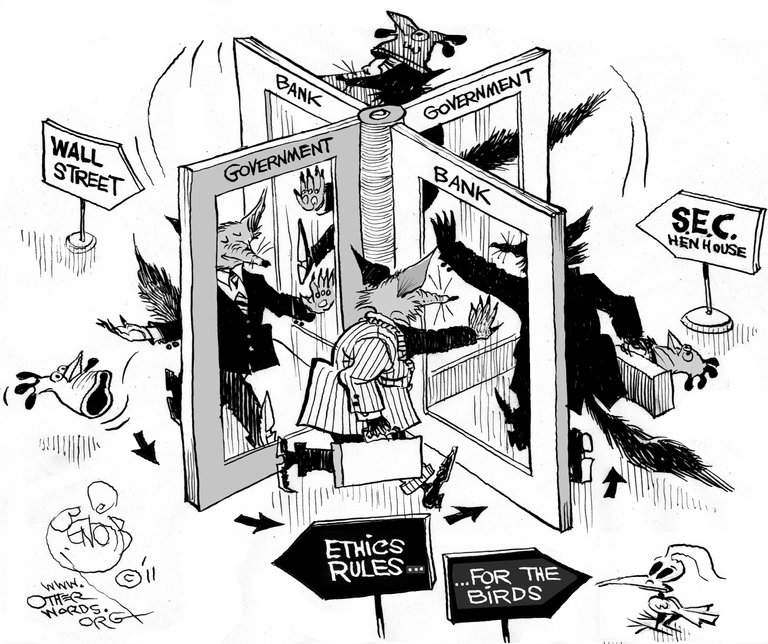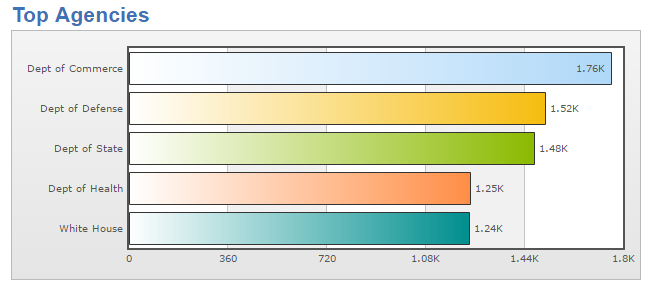It has been well known for decades that a revolving door problem has existed in the United States, but the extent of which, was not fully realized until the wake of the financial crisis. For those unaware, the “revolving door” refers to the movement of legislators and regulators between the regulatory bodies and companies and organizations they are regulating. An example would be if I worked for the Security and Exchange Commission and one day quit my job and was hired at Goldman Sachs, a former company I was regulating. This might seem ok at first glance, but when we really examine the effects it has on the entire industry it becomes apparent the amount of corruption that goes on

Regulators Getting Too Close To The Companies They Regulate
The biggest problem by far is how the revolving door allows companies under regulation the ability to influence regulation as a whole in the industry. Most people working at the regulatory bodies are not making salaries anywhere near the salaries of the companies in the private sector , which makes it tempting to get cozy with them. There is a huge “you scratch my back and ill scratch your back” mentality amongst regulators working with the Big Five banks, in the hopes that if they look the other way or allow certain issues to pass under the radar, one day they will be offered a job within the company.
Wall Street firms claim it doesn’t happen but the reality is that this is common practice amongst banks and other large Wall Street firms, with Opensecrets.org reporting over 6,000 currently employed individuals who have moved from regulation jobs to the private sector or vice versa. The entire point of a regulatory body is to make sure that companies are not abusing the system, which is made impossible when the people that are supposed to be watching these companies are essentially on the same team. In recent years Goldman Sachs has become such a large offender that after a massive investigation it was found Federal Reserve secrets were leaked to a Goldman Staffer. Goldman lost all ability to consult with the Federal Reserve for the near future, but still has questionable hiring practices. In recent times It has become so bad that this year the Federal Reserve announced that it would be moving consultants from the banks it regulates to different offices just so they could be further away from regulator employees.

The hiring practices of banks, in regards to hiring former regulators, are essentially a form of legal bribery. There is no line that won’t be crossed if it means more profits or less regulation for the banks. We have additionally seen this in the amount of lobbying that banks do to strike down bills that threaten their profit margin. Things have become better at the moment, but the history of banking regulation goes through short periods of over regulation and under regulation. It is not crazy to think that in the near future, the laws that are being created now will become repealed.
How The Revolving Door Partly Lead To The Financial Crisis
The real reason for the recent crackdown on the revolving door problem in the United States comes in the wake of the financial crisis of 08/09 that threatened economic collapse. One of the main problems was regulators that were supposed to be rating mortgage backed securities and other investment products realistically, were just taking the banks word that they had done their due diligence. In reality products that were getting AAA ratings were actually garbage, which is why trillions of dollars were lost. Common layman investors who trusted regulators to do their job and give them a fair risk analysis were wrecked. It became apparently clear after senate hearings about the financial crisis that the banks were essentially just regulating themselves.

How Can We Stop This Practice?
The hardest part of this whole situation is how to actually crack down on these types of situations. There are radical things we could do, like make laws that regulators can’t work for the organizations they regulate for a period of time after a job exit, but these laws won’t pass. The reason they won’t pass is because the banks have a collective interest in not letting these types of laws get created and will lobby them until they get struck down. In addition many of the legislators who we elected to create these types of laws are also the largest offenders of the revolving door policy. What we can do right now is try and publicly shame those who participate in the open door policy and make it clear when electing new officials. Opensecrets does a great job of collectively making a list of these people to better inform the public. If allowed to prosper, the revolving door problem will just bring us back to another 08/09 crisis where the only ones who get hurt are you and me.
-Calaber24p
Yep, but that wont be the primary player of the next crash. The most likely culprit will be debt and over leverage on a global scale. It will probably make 08 look tiny in comparison. You can't fix a debt problem with more debt!
I don't think it will totally cause the next another crash, but it could definitely be a factor. I dont think it will cause the next crash because right now banks are still being looked at under a magnifying glass because of 08. However in the future once people start to forget, it could happen again. I agree over leveraged debt, both public and private, will probably cause the next crash.
Yes. Banks are better capitalized now then they've probably ever been. The next crash won't be caused by them. Central banks cant control a market forever, that loss of control will be the catalyst for the next plunge, in my opinion of course :)
Just wait the government is just warming up, the fed will start the printing press to try and payoff the debt with worthless dollars. The corruption runs deep, not sure how all this will end up.
https://steemit.com/money/@bythenumbers432/why-the-federal-reserve-cannot-raise-interest-rates-an-inconvenient-truth
Did you mean http://www.opensecrets.org/?
Yes sorry changing that now
I just started an article about our government and financial system. I will reference you in my 2nd part. Please check it out and let me know what u think. https://steemit.com/politics/@knircky/steem-for-the-win-i-don-t-care-who-wins-the-white-house
Cool I will thanks.
It is a very big nut to crack. It is interesting to watch the similarities in steemit to real world politics.
Whales --> Dolphins --> Minnows = Executives --> Management --> Employees.
Executives work their way through the ranks. They make connections who will provide favourable advise/votes. They work very long hours, make many hard decisions. It's very rare that people focus on the journey they took to get to the top, they only recognize that they are at the top.
Do they deserve it? In my opinion, yes.
"It is well enough that people of the nation do not understand our banking and monetary system, for if they did, I believe there would be a revolution before tomorrow morning." - Henry Ford
Well put, cheers mate!
"What we can do right now is try and publicly shame those who participate in the open (revolving?) door policy and make it clear when electing new officials. "
One thing we could do is increase the sallleries of regulators to make them competitive with banks.
More money for banksters?
its hard to get that past congress. It is one of the proposed ideas, but the government is never able to compete with the private sector on how high they can pay, especially the banking industry.
https://www.theguardian.com/business/2016/jul/08/jose-manuel-barroso-to-become-next-head-of-goldman-sachs-international
http://www.goldmansachs.com/media-relations/press-releases/archived/2002/2002-01-28.html
"Chancellor on brink of second bailout for banks"
That is when it all started, remember 1/3/2009.
Do you know the little easter egg about why I included that specific paper? :)
It's Bitcoin. Tell me the easter egg.
It is the paper that Satoshi took a picture of and posted when he released bitcoin.
I dont think the corruption will ever stop its human nature
Regulation should be abolished, and that's that. Market doesn't need regulation. I see corruption as a good and healthy reaction to totalitarian practices like regulation.
I really want a copy of this :)
they are so expensive at this point because theyre considered collectors items
it's a niche piece. It's not really expensive right now. Just very hard to find!.
For me, a btc collector, it's a must have!
they are pretty expensive, last one I know of sold for $3500 on bitcoin talk and that was 2 years ago. Now collectors are asking 5k +
I know this is an older article, but I must comment on it.
You are right on both counts. The reason many things won't change is because of the $$$ that is involved and those who can change it are perpetrating it. This happens in many areas of law, not just the SEC and Wallstreet.
Publicly shaming the behavior is absolutely the right thing to do. If people aren't aware that they are getting screwed, they won't call attention to it. Those that are getting screwed, need to keep talking and sometimes TALK LOUDER.